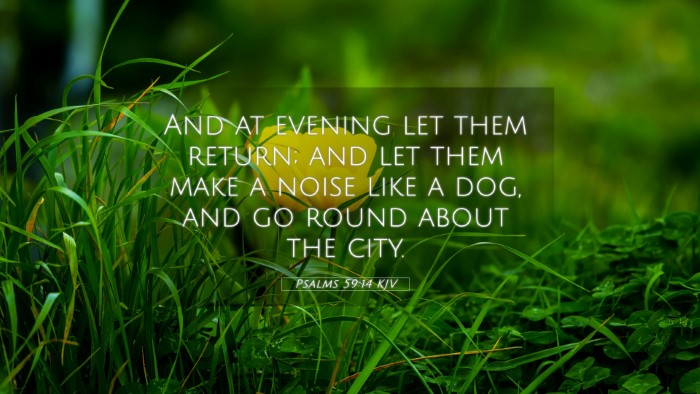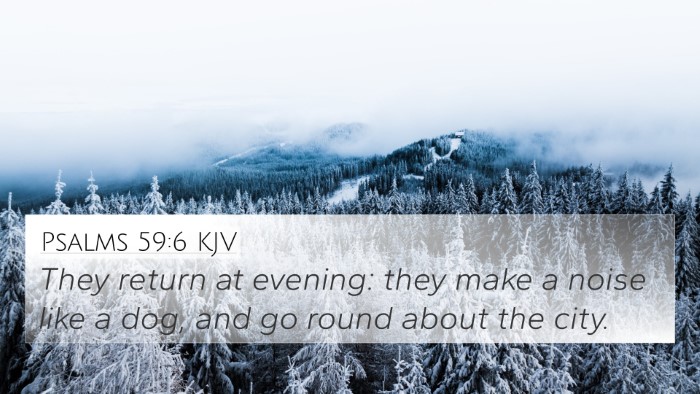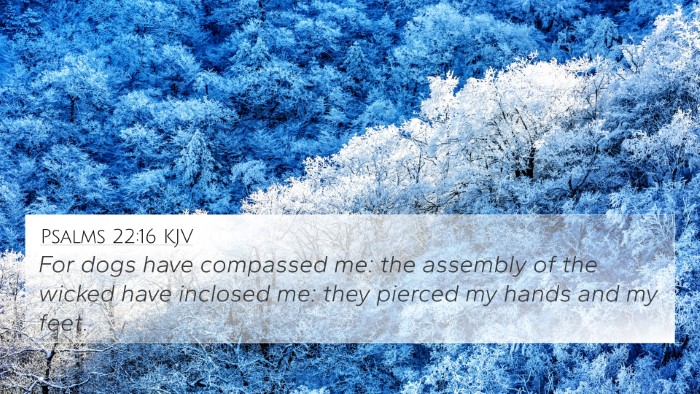Psalms 59:14 - Meaning and Interpretation
Psalms 59:14 states: "And at evening let them return; and let them make a noise like a dog, and go round about the city." This verse, part of David's lament against his enemies, encapsulates themes of divine protection, the wickedness of adversaries, and God's eventual deliverance.
Overview of the Verse
This verse describes the behavior of David's enemies as they prowl and make noise at night, akin to dogs seeking sustenance and barking in vain. The imagery used evokes a sense of chaos and danger that encircles the psalmist, who finds solace in God's watchful deliverance.
Commentary Insights
-
Matthew Henry's Commentary:
Henry emphasizes the vulnerability felt by David when confronted by his enemies. He notes that dogs, often seen as unclean animals, signify a lack of dignity in the threats against him. The verse reflects the noisy and relentless nature of those who seek to harm him.
-
Albert Barnes' Notes:
Barnes highlights that the "evening" setting emphasizes the continuous nature of danger that David faces. The noise symbolizes the futile posturing of his enemies, ultimately serving to underscore their inevitable defeat, as God is the refuge of the righteous.
-
Adam Clarke's Commentary:
Clarke points out that the behavior of the enemies demonstrates their relentless pursuit of David, much like dogs that prowl the streets. He suggests that this passage illustrates the agony of being surrounded by foes without respite, yet, it also leads to an expectation of God's intervention.
Cross-References
To enrich your understanding of Psalms 59:14, the following cross-references can be explored:
- Psalms 22:16-18 - This passage speaks of dogs encompassing the psalmist, enhancing the imagery of threat and vulnerability.
- Psalms 68:23 - It refers to the downfall of the enemies, reflecting God's triumphant protection.
- Psalms 10:7 - Discusses the wicked continually plotting and speaking deceit, which links to the noise made by dogs.
- Psalms 34:21 - Implies that evil shall slay the wicked, adhering to the themes of justice and divine protection.
- Psalms 91:5-6 - Discusses the terror of the night, resonating with the atmosphere David describes regarding his enemies.
- Lamentations 3:52-53 - Echoes the ideas of being pursued unjustly, emphasizing the agony of the afflicted.
- Matthew 7:6 - Refers metaphorically to dogs regarding the treatment of sacred things, which provides a moral contrast.
- Philippians 3:2 - Paul warns of 'dogs' in a metaphorical sense, linking the hostility found in both David's time and the early church.
- Romans 8:37 - Encourages the faithful that they are more than conquerors, elaborating on God's protection amidst adversity.
- Revelation 22:15 - Speaks of 'dogs' in a warning against the wicked, illustrating a continuity of thematic elements from the Old Testament to the New Testament.
Connections Between Bible Verses
Understanding Psalms 59:14 in the context of these cross-references pairs the Old Testament lamentation with rich New Testament themes of perseverance and victory over adversaries. The verse serves as an excellent example of scriptural cross-referencing, illustrating how biblical texts relate to one another through shared themes of divine protection and the nature of evil.
Thematic Bible Verse Connections
Several overarching themes emerge from the analysis of Psalms 59:14 and its corresponding verses:
- Divine Protection: Many verses reinforce the idea that God protects His people from harm.
- The Nature of Evil: The description of enemies as 'dogs' reflects the treachery and lowliness of wickedness.
- Hope Amidst Adversity: Recurrent themes of hope, deliverance, and God's ultimate justice offer solace to the afflicted.
- Human Vulnerability: The psalmist's genuineness in expressing fear illustrates the vulnerability the faithful experience.
- Judgment of the Wicked: Many linked verses indicate a promise of judgment against the unrighteous.
Conclusion
Psalms 59:14 serves not only as a profound declaration of David's plight but also as a tapestry woven with connections to many other scriptures that discuss the nature of evil, the hope of the righteous, and God's ever-watchful eye. Exploring this Bible verse cross-reference will lead readers to a deeper understanding of the narrative that interlaces the past with teachings that remain relevant today.




